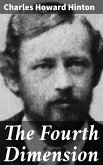In Edwin A. Abbott's groundbreaking mathematical treatise 'Flatland,' readers are taken on a journey to a two-dimensional world inhabited by geometric shapes. Through the protagonist, a square named A. Square, Abbott explores the limitations of perception and society's resistance to change. The book is presented as a satirical examination of Victorian society, but also serves as an allegory for the complexities of dimensions and the nature of reality. With its inventive narrative style and thought-provoking concepts, 'Flatland' challenges readers to reconsider their own perceptions of the world around them. Abbott's use of mathematical principles to create a social commentary elevates the book to a unique work of literature that continues to inspire readers and scholars alike. Abbott's background as a mathematician and theologian undoubtedly influenced his creation of 'Flatland,' adding depth and complexity to the themes explored in the book. I highly recommend 'Flatland' to readers interested in philosophy, mathematics, and societal critique, as it offers a truly original and intellectually stimulating reading experience.
Dieser Download kann aus rechtlichen Gründen nur mit Rechnungsadresse in A, B, BG, CY, CZ, D, DK, EW, E, FIN, F, GR, H, IRL, I, LT, L, LR, M, NL, PL, P, R, S, SLO, SK ausgeliefert werden.









